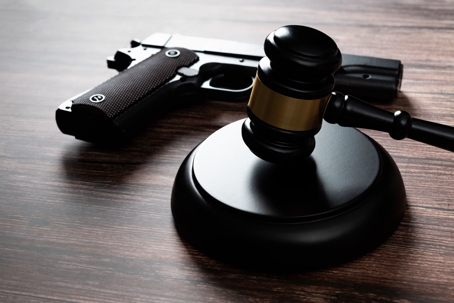If you or someone you love has been charged with Discharging a Firearm into Occupied Property, you probably have many questions. What does this charge mean? Is it serious? How can the state prove it? What happens if I am convicted?
N.C.G.S. § 14-34.1 makes it a Class E felony to discharge a barreled weapon or firearm into occupied property. The offense is elevated to a Class D felony if the property is an occupied dwelling or an occupied vehicle in operation, and to a Class C felony if the discharge causes serious bodily injury.
These offenses are commonly referred to as:
- Discharging a Firearm into Occupied Property (Class E)
- Discharging a Firearm into Occupied Dwelling or Conveyance in Operation (Class D)
- Discharging a Firearm into Occupied Property Causing Serious Injury (Class C)
In all these cases, the state must prove:
- That a person intentionally discharged a firearm and
- That a bullet from that firearm was discharged into the property and
- That property was occupied at the time it was struck
Intentional Discharge of a Firearm
First, the state must prove that the discharge of the firearm was intentional, and not accidental. If a gun is accidentally discharged and a bullet strikes occupied property, then a person would not be guilty of this crime. However, the State isn’t required to prove that someone intentionally discharged a firearm at the occupied property. This crime is what is commonly referred to as a general intent crime. It means that intent is proven when the evidence shows that a person fired a gun on purpose, not that they were aware of the eventual destination of the bullet.
Discharged Into Property
In order to prove that a property was discharged, the state does not need to show evidence that bullets entered the interior of a property. For example, if any projectile is found in the exterior façade of a home or in the fender of a car, that projectile would be found to have been discharged into a property. That is true even if the bullet did not enter a room of the house or the passenger compartment of the car. Our courts have recently held that even a bullet fired into a toolbox in the back of a truck bed counts as discharging a firearm into property
Attempting to discharge a firearm into occupied property is punished the same way as the completed act. Meaning that if the state can prove that someone tries to fire a gun into a car, a home, or other property and misses, they can still be charged with this offense at the same class of felony. However in order to prove someone attempted to discharge a firearm into occupied property the state would have to prove intent to discharge the firearm into that specific property, unlike the completed offense.
Property is Occupied at Time of Discharge
Finally, the state must prove that the property was occupied at the time of the shooting. While the statute itself does not define the term “occupied,” it is generally understood that property is occupied if someone actually is present there. Our courts have clarified that a house is even occupied if folks are on the porch when the weapon is discharged.
How Many Charges Can Occur?
When someone is accused of Discharging a Firearm into Occupied Property, they can be charged with a separate offense for each bullet that is fired during the incident in question. Our state Supreme Court has recently said “discharging a firearm means firing a shot; each distinctly fired shot is a separate discharge of a firearm.”
Initially, a person may only be charged with one or two counts of Discharging a Firearm into Occupied Property, but the state will add or threaten to add more of the same charges once they have reviewed the evidence. Each of those charges may be sentenced consecutively, or “boxcar” to create lengthy prison sentences. That makes dealing with these incidents extremely risky without a lawyer’s help.
What Is the Sentence?
The penalty if the state can prove Discharging a Firearm into Occupied Property is a Class E felony. That is punishable by several years of imprisonment, although probation is an alternative for someone with little to no criminal history.
If the state is able to prove that the occupied property in question is a house, trailer (a dwelling) or a car or truck (a conveyance) in operation then they can elevate the charges to a Class D felony. Class D felonies are serious punishment; an automatic prison sentence of over three years of imprisonment or more, with no probation except in exceedingly rare circumstances.
Finally, if the state is able to prove someone was injured by the bullet discharged into the occupied property, the offense would be punished as a Class C felony. That is also an automatic prison sentence of no less than close to 4 years, with no probation except in rare circumstances as well.
A conviction for Discharging a Weapon into Occupied Property is a life-altering experience. If you have been charged with this offense the best course of action is to consult with one of our experienced attorneys immediately.

